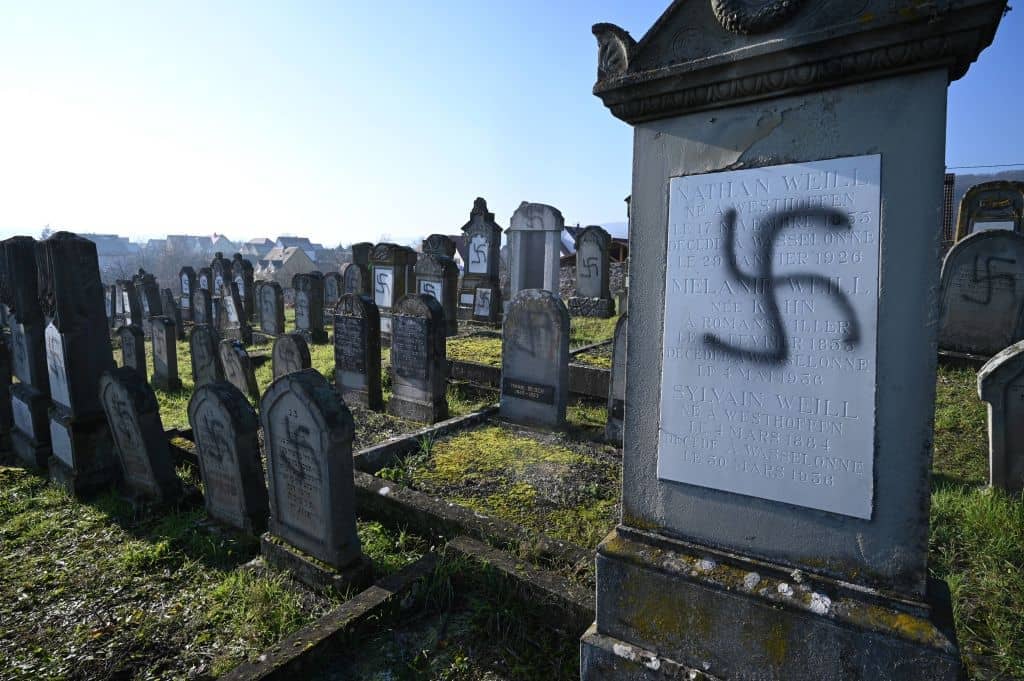A day after the Israeli ambassador to Britain, Tzipi Hotovely, was harassed as she left the London School of Economics, a murder trial in France reached its grisly conclusion. Yacine Mihoub was handed a life term after being convicted of stabbing 85-year-old Mireille Knoll multiple times and then setting her body alight in March 2018. The elderly woman, a Holocaust survivor, had known Mihoub since he was a boy, but he still snuffed out her life because she was a Jew. An accomplice claimed Mihoub screamed ‘Allahu Akbar’ as he stabbed Knoll.
It was a murder almost identical in nature to that of Sarah Halimi, slain in the same arrondissement of Paris a year earlier. Her assailant also shouted ‘Allahu Akbar’ as he took the life of the retired Jewish doctor.
The killing of Madame Halimi was anti-Semitic, even if parts of the French political establishment pretended it wasn’t. Her killer, Kobili Traoré, subsequently escaped trial after France’s highest court of appeal ruled that he was not criminally responsible for his actions. The judges ruled that Traoré had been undergoing a ‘psychotic episode’ because of cannabis consumption.
This cowardice drew a sharp response from some French intellectuals, who signed an open letter decrying the ‘politics of the ostrich’.
‘It’s always the same story in France,’ said one of the signatories, Bernard-Henri Lévy. ‘Anti-Semitism is not supposed to exist, especially among minority communities.’
‘It’s always the same story in France,’ said one of the signatories, Bernard-Henri Lévy. ‘Anti-Semitism is not supposed to exist, especially among minority communities.’
For French Jews, the diabolical murder of Halimi, and the political reaction that followed, had strong parallels with the death of 23-year-old Ilan Halimi (no relation to Sarah), who in 2006 was abducted and tortured to death over the course of three weeks by a Paris gang led by a man who described himself in court as an ‘African Barbarian Armed Revolt Salafist’.
The unwillingness of the authorities to confront the growth of anti-Semitism in France this century, despite repeated warnings, only emboldened those who wished to eradicate the country’s Jewish community. In 2012, Mohammed Merah shot dead three Jewish schoolchildren and their teacher; three years later, Amedy Coulibaly murdered four customers in a Jewish supermarket in Paris. In between those two atrocities were the riots of July 2014, when over several days hundreds ran amok in the northern Paris suburb of Sarcelles, looting and burning Jewish shops and businesses. It was their way of protesting against the Israeli offensive in Gaza.
It is no surprise that a report last year by the London-based Institute for Jewish Policy Research revealed that France’s Jewish population is diminishing at an alarming rate, with 51,455 having moved to Israel since 2000. Jews in France represent just one per cent of the population, but in 2019 they were the victims of more than half of the country’s religiously-motivated assaults.
The report also noted that Britain’s Jewish population has declined by 25 per cent from 1970, down to 295,000 members, but at the same time ‘the community is displaying potential for growth, as 33 per cent of its households have at least four children’.
Will they remain? Anti-Semitism in Britain is not as profound, and certainly not as violent, as it is in France, yet there are ominous signs that it is heading in that direction, even without the presence of Jeremy Corbyn on the Labour front bench.
The intimidation of Tzipi Hotovely was the second significant anti-Semitic incident in London this year; in May, a convoy of cars draped in Palestinian flags drove through the capital with a man shouting anti-Semitic abuse from a megaphone. A week later, there was a more peaceful pro-Palestine demonstration in London, one in which a Metropolitan police officer was filmed pumping her fist in the air and shouting ‘Free Palestine’.
As Jake Wallis Simons wrote this week on Coffee House, in among the Palestine flags being waved at the retreating Tzipi Hotovely outside LSE on Tuesday evening were banners bearing the logo of Kata’ib Hezbollah, a radical Iraqi Shi’ite paramilitary group, and a pro-Iran organisation called Innovative Minds. It increasingly feels that these factions from the Middle East have come to Great Britain, just as they have been implanted in France for a decade and more. The French have a name for this phenomenon, they call it the ‘Lebanonisation ‘ of their country. It explains the rise of Eric Zemmour who, in a recent television debate envisaged a France in 2050 that will be a bigger version of Lebanon, riven by poverty, disorder and violence.
After the schoolteacher Samuel Paty was beheaded last year for blaspheming, the Algerian writer Boualem Sansal expressed his horror at the killing but not his surprise.
‘I see no political policy towards Islamism in France,’ he told a newspaper. ‘It’s the policy of ‘wait and see’, the ‘politics of the ostrich’.’
It’s a policy adopted by the British political class, who now have their heads so firmly in the sand that they are incapable of standing up for a teacher in Yorkshire, hounded out of his school for a similar ‘crime’ as Paty; or naming the ideology responsible for the death of one of their own. Instead they blame the death of David Amess on the toxicity of social media. It would be laughable were the situation not so grave.







Comments